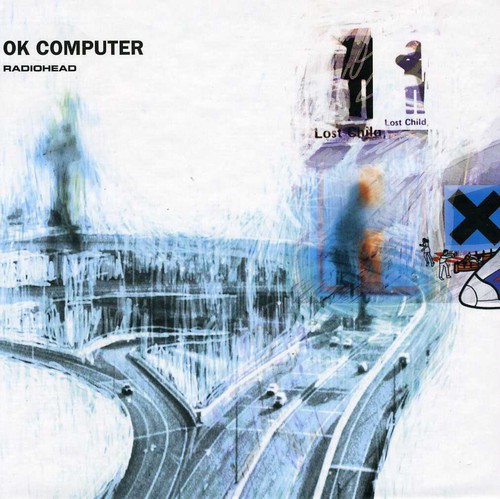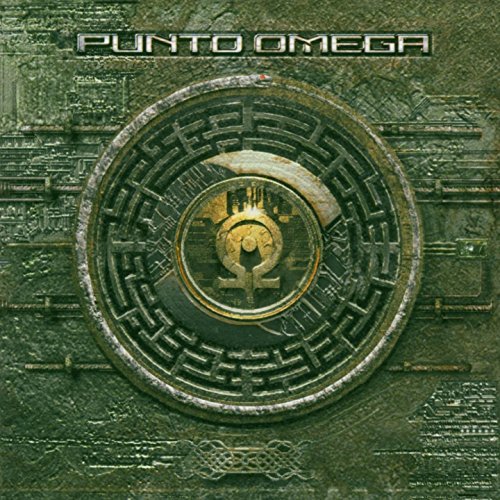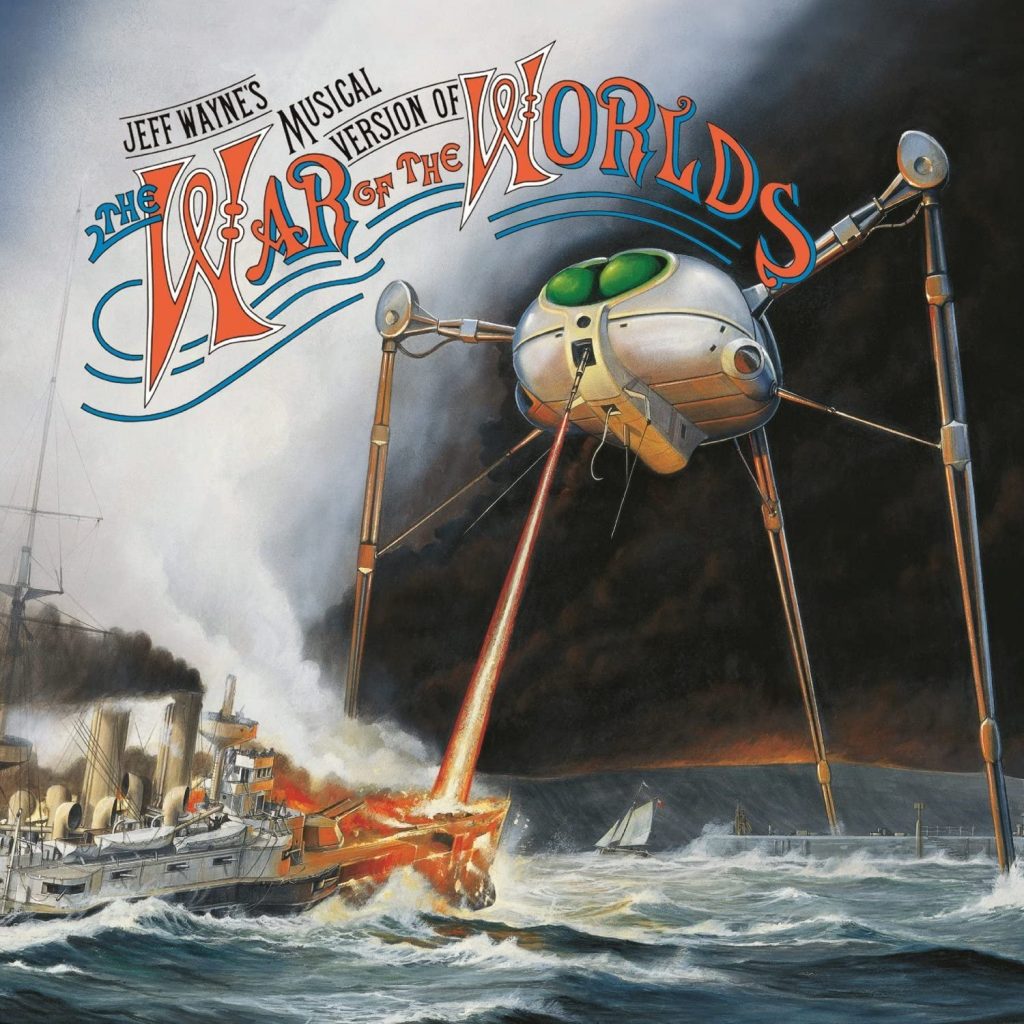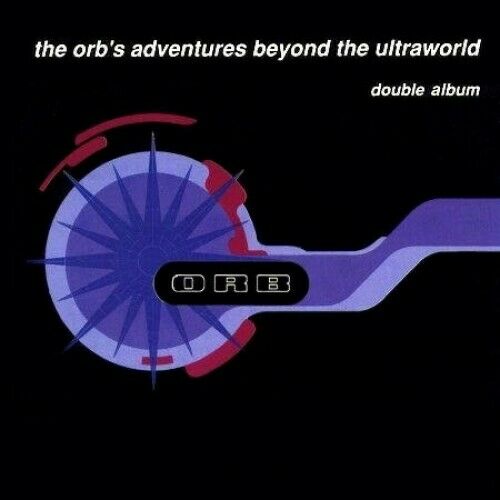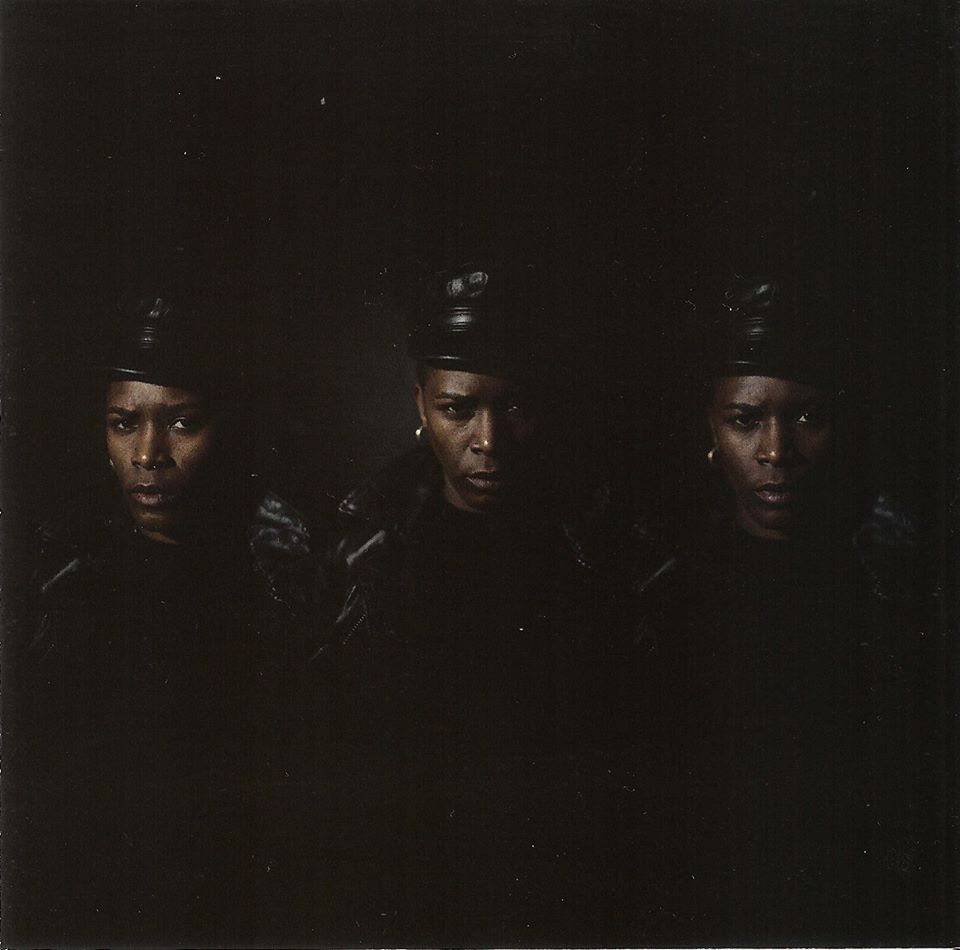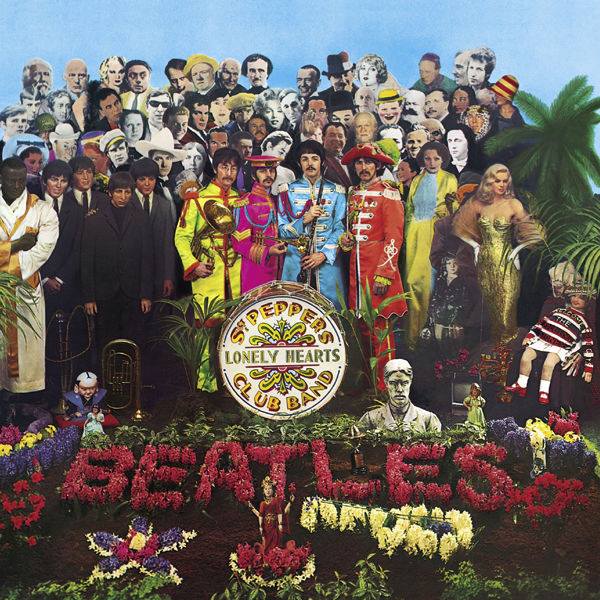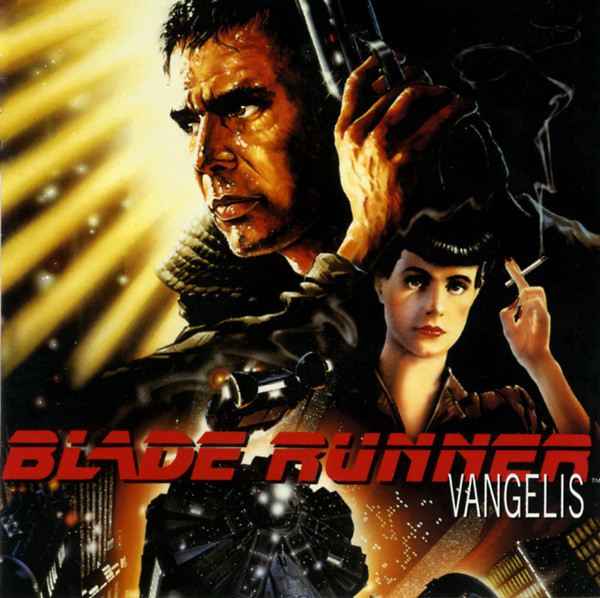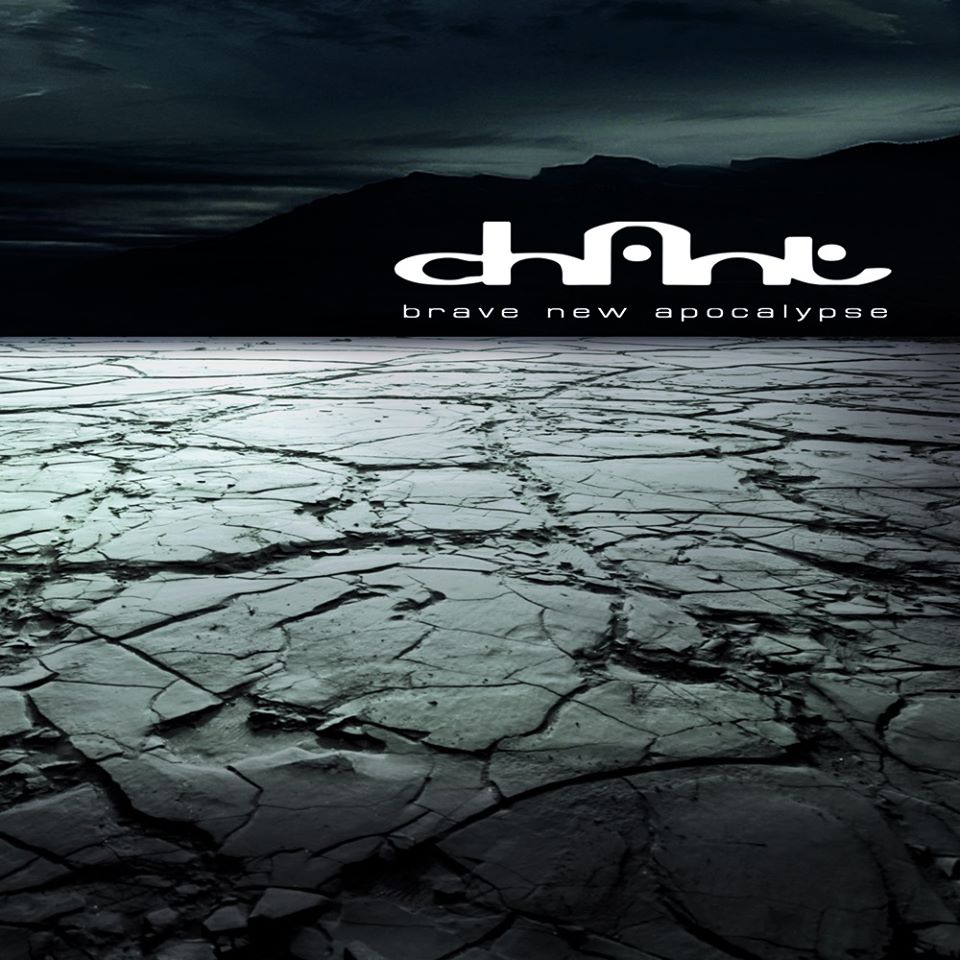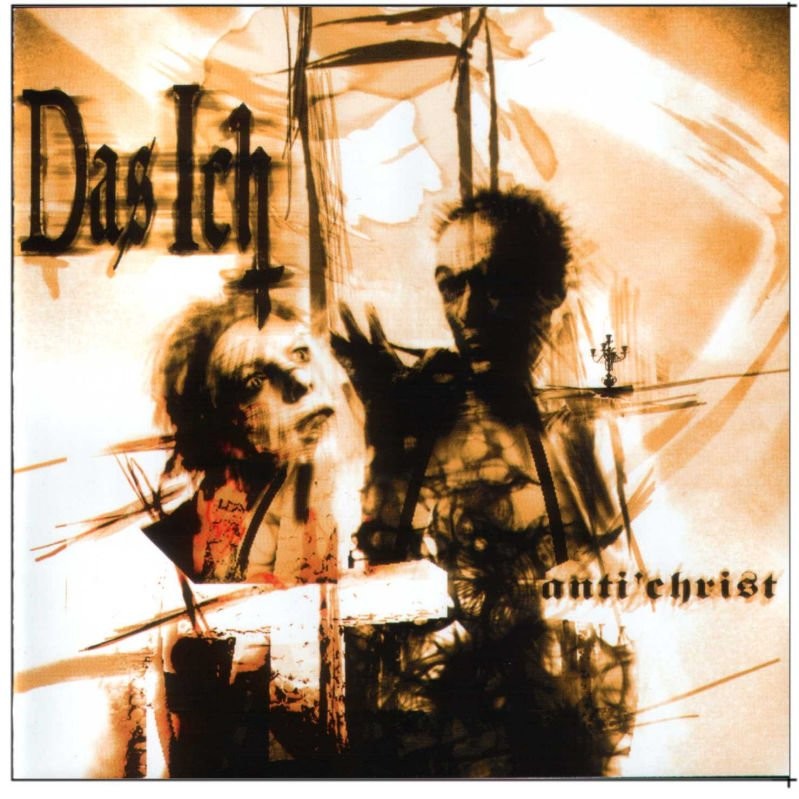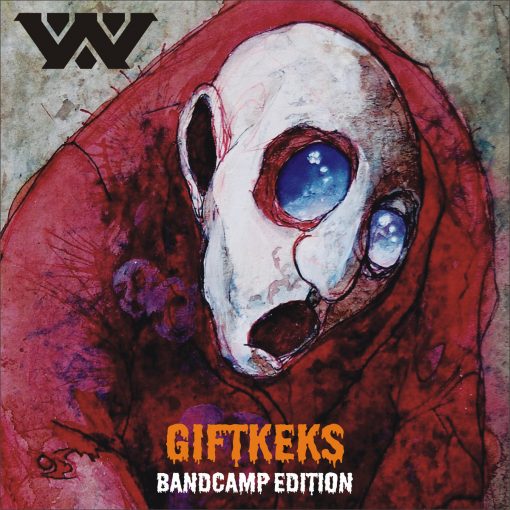Day 31 – Radiohead – OK Computer
When I began my degree in 1997, there were certain contemporary albums that were regarded as ‘student standards’ with which you could scent your territory and locate the like-minded. Those bearing Oasis ‘Be Here Now’ soon became a case of ‘Was There Then’. My own choice of Prodigy ‘The Fat Of The Land’ was also commonly found, though this too became devalued by those jumping on the superficial elements and ignoring the subtleties (I’ll tell that story another time).
But if you wanted to be seen as being ‘in the know’ musically, you’d have a copy of Radiohead’s ‘OK Computer’, which I heard a few times and finally acquired around the Christmas break. Whilst student posturing is long since gone and good riddance to it, this album remains a keeper from the era, so maybe those self-important twats who’s company I had to endure for at least my first year had got one thing right. Because this is the very antithesis of the catchy sing-along indie chart-toppers. Yet it topped the charts too.
The musicology of this album has been well covered in the rock press, to a degree which almost spoils the enjoyment, rather like the way classic English literature would have been more enjoyable had I not had teachers telling me to pass an exam in it. But many songs had a personal impact here – the three-incomplete-songs-ingeniously-combined that formed “Paranoid Android” and the resigned lullaby-like chimes of “No Surprises” were a perfect statement of my mood back then, and still often have the same effect today.
The previously released “Lucky” also has resonances that brings back memories best not gone into here. The Romeo+Juliet excerpt “Exit Music (For A Film)” works terrifyingly well as a standalone. “Climbing Up The Walls” just defies all description beyond the personal satisfaction that so many posturing elitists have a song this experimentally bizarre in their collection. And even that interlude, the robot-voiced “Fitter Happier”. A checklist of right-and-proper lifestyles as of the late 1990s, a list of things one was expected to be and expected to do.
Exactly the person I didn’t become.
Like a pig. In a cage. On antibiotics.
Day 32 – Punto Omega – Punto Omega
Back to an obscurity of sorts, but also a notable first in this series for two reasons. The first albums from a band hailing from the Southern Hemisphere. Also the first album written in a language of which I have next to no understanding. Punto Omega are from Argentina, they write in Spanish, and they work in that harsh EBM/aggrotech/hellektro style to which I was over-exposed back in my Slimelight days and tired of around the time I stopped going with any frequency. So how the hell does an album like this make into my all-time classics?
It’s all down to the sense of scale and ambition. A genre of music that never demanded vocal talent and became formulaic once the ReFX Vanguard and Access Virus presets became common knowledge still had room for creativity if you were willing to push the boundaries. And this album doesn’t wait to do so – the opening pairing of tracks, now joined in my playlist as (Marcha Hacia el) Punto Omega class as my choice for the greatest album opening of all time. The martial drumming, strings and choirs, the fanfare of Galician bagpipes before the that wham-moment when the bassline kicks in, the jagged riffs join and by this point I have no concern about what those scathing lytics acutally mean, as I’m already won over.
It’s an opening that sets up the album as whole, which offers considerably more variance and dynamism than other albums in the style. There’s an appearance from Thomas Rainer on “La Fusión”, back in the days when he could be respected as a songwriter and producer rather than castigated for his edgelord egotist Nachtmahr antics that have done nothing but divide a scene that doesn’t need this kind of shit. As for Punto Omega themselves, they disappeared after two more albums, but was still left with one more enduring memory.
Wave-Gotik-Treffen 2007, open-air stage in the Parkbühne. Punto Omega arrive on stage as the venue clouds over. Late in their set, they begin their self-titled march, the pipes cry out as flashes of thunder and lightning echo out. Two more songs as the raindrops fell, and they leave the stage as a torrential downpour falls upon those of us who were only waiting for Rabia Sorda. It was the last time I ever devoted a WGT to this style of music, but the one lasting association I made was this album and it’s title track – from this day on, inextricably associated with thunderstorms. On the rare occasions I’m at home when one occurs, this becomes the backing music.
Face it, it wasn’t going to be anything quiet, was it?
Day 33 – Rotersand – Welcome To Goodbye
Firstly a confession – I wasn’t initially won over on this album. Despite receiving rave reviews within the scene, it’s first impression on me was a technically-good album that was just a bit TOO technical. I always thought great albums had to be forged in adversity and succeed again the odds. This album was destined to be great from the outset. Only when I saw it performed live did I finally hit upon that vital element that everyone else seemed to have picked up on right away.
Krischan might be the studio wizard, but if there’s one thing I learned from those German festivals is that it’s the sizzle that sells all those sausages, and Rascal is the man who provides it. And once I’d captured that aspect of this bands appeal as an audience member did I take it home and gain new appreciation for this recording. Because there’s real humanity contained within what is still for the most part machine music.
And it’s an album that’s also significant in the development of “the sound of the scene”. At a time when the bank of futurepop was running out of credit and (as suggested yesterday) harsher sounds were taking over, Welcome To Goodbye provided a more subtle way to advance the trance/tech/EBM/pop hybrid sounds of recent years. The first part of the album is continuous suite, with the generational tale of “The Last Ship” and the percussive fury of “Storm” proof that Covenant didn’t have a monopoly on water-related metaphor in this style.
The variance continues – the acoustic ballad “By The Waters” is something you wouldn’t normally expect on a Dependent Records album but it’s mixed in a manner that makes it sound like it belongs anyway. The only real ‘stick outs’ are the hard edges of “Would You Buy This?” which were closer to the kind of thing Combichrist were doing at the time and the noisy riffs of “Alive”. Despite being essentially a dancefloor-oriented project, the influence of rock was never far away.
And I can’t ignore “Exterminate Annihilate Destroy” – released shortly before the Doctor Who franchise returnd to our screens, it’s the obvious anthem from an album that could have otherwise have offered any number of alternatives – “Undone” and “All In All” proof that their songwriting and production skills are all that are necessary to deliver a decent tune. Rotersand aren’t reliant on gimmicks, they’ve got far more integrity than that.
There’s an alternate universe out there where electronic music of this ilk never found it’s way into the industriogothic collective and instead found a home in the mainstream dance scene. I can just imagine Mixmag claiming this to be the “Pink Floyd of progressive trance” or something. …
Day 34 – Jeff Wayne – The War Of The Worlds
Back in my primary school, the headmaster tried to hammer some culture into the cockney reject offspring that comprised the school roll by playing music through a hi-fi at the front of the hall as we walked into assembly – a new record each week. Mainly classical recordings, with the composer name written up on the board in the hope that some of us might remember it. But one week he chose this. We never got much further than the iconic first track each morning, but as one already gaining an interest in outer space and the concept of extra-terrestrial life, my attention was secured.
A poor quality cassette copy taken from a library loan had to suffice after that and I soon forgot about it until many years later, when I spotted it lying idly in a low rack in the MVE Notting Hill basement. And as elaborately-strung synth-rock is as much my thing now as it was back then, it was a welcome rediscovery – only now I recognised most of the participants. All-star casts often end up being less than the sum of their parts, but on this occasion the pieces really do fit. Richard Burton’s ominous, epic commentary, vocals from Justin Hayward, Phil Lynott and Chris Thompson and a countless cast of musicians.
The use of repeated themes – iconic leitmotivs appearing in subtly different forms as the story progresses. But the album can also be enjoyed in pieces – “The Eve Of The War” is an obvious choice, whilst folk-rock tinged “Forever Autumn” was issued as a lead single. But two others left a mark on me – “Thunder Child” is a moving tale of sacrifice and lost hope, whilst “Dead London”, in which the story effectively resolves, has more meaning now than ever before. Only in this tale, microscopic lifeforms are the hero of the story, not the villains.
Day 35 – The Orb – Adventures Beyond The Ultraworld
I’ve put a few 90s dance albums in this series, but it’s time to track back to the root cause. A copied C120 cassette was handed to me around Christmas 1995, with the only clue being a bewildering tracklist and a handwritten “the best chill-out music ever” – in other words, this album. And the reason why I mention the the length of the tape (yes, I bought a real copy soon enough) is because this is a LONG recording. In terms of the influence it had on me, the atmospheric aspects had me won over fairly quickly, but it took much longer to untangle the details and figure out what the hell was going on here.
At the centre of the project is Alex Patterson of Battersea, who’s music career began a Killing Joke’s roadie – a band which later became a massive part of my personal playlists. He initially formed The Orb in collaboration with Jimmy Cauty of KLF fame. Influenced by Chicago House, but stretching out the compositions with heavy influences from psychedelia and dub reggae, it pioneered a style that later became known as ‘ambient house’ – and that’s enough of the dance music sub-categorisation. Because I’ve never actually danced to this – it’s an album for listening.
Admittedly, I did get the 18 minutes and 48 seconds of that ultimate trip-fest “A Huge Ever Growing Pulsating Brain That Rules from the Centre of the Ultraworld” into a Terminates Here set once, the second-longest track I’ve ever played, but that was during Alt Bring’n’Buy setup time. If it was good enough for a John Peel session, it was good enough for me. It’s the only remnant on the album of Cauty’s involvement, as he went back to focus on KLF and various other projects. And his replacement?
For one track at least (plus a few others further down the line), it was Martin Glover – aka Youth, and there’s the ‘Joke connection once more. The song? “Little Fluffy Clouds” – despite essentially being built round a reminiscing interview with Rickie Lee Jones, it’s the nearest thing this album gets to a conventional dance track, sensibly placed right at the start, leaving you free to zone out to the rest of it once it’s done. And since The Orb is essentially Alex plus whoever he damn well pleases, we also get appearances from another former ‘Joker (Paul Ferguson), psych-guitar legend Steve Hillage and future on-off collaborators Kris Weston and Thomas Fehlmann.
And unlike other epic scale albums that justify their length via po-faced self-importance, there’s a underlying sense of humour. The oddball samples, the strange song titles, the bizarre but intensely catchy skank rhythmics of “Perpetual Dawn”, and the way the “Loving You” sample ended up as a soundalike cover to get round an awkward sample clearance issue. The fact that I still have time for this album today despite my considerably darker and harder preferences suggest that, if nothing else, I got the joke. Not the Killing one. This Joke is on Alex.
Day 36 – Light Asylum – Light Asylum
One of very few recordings in this series less than a decade old. That’s not to the discredit of the many excellent albums that came out in the 2010s, it’s just in terms of personal influence, such things take time to fully realise. One of the reasons I stopped writing reviews of new releases is because I have to live with an album for some time before I truly appreciate its relevance. But this one made it’s mark more quickly than most.
The growth of minimal, melodic synth-based music throughout the last decade was a welcome development in a musical world that had been full of worthy-but-dull guitar rock, easy-sell “emotional singer-songwriters” and dynamically squashed EDM. But even here, one had to search hard to find the gems – it’s an easy style to do averagely well, and hence it’s very hard to stand out – Suicide had the whole ‘lo-fi synths and singer who doesn’t really sing’ thing covered before many of us were even born – it’s long been my belief they were classified as ‘punk’ because they long pre-dated the invention of any specific genre tag with which to describe them.
And this is where Light Asylum – also from New York, as it happens – have an advantage. Whilst the new minimal wave has seen an encouraging rise in the number of female practitioners, Shannon Funchess remains one of the few black female artists in this whole genre, ever. And she brings a particularly strong voice to the style – one comment I heard last Infest was ‘Grace Jones meets Alison Moyet’, but however you describe her style, it gives Light Asylum that ‘special something’ in a field where vocal talent isn’t celebrated anything like as much as it should be.
The music is strong, too, the persistent drum programming cutting the air and driving the songs forward, whilst the melodic elements always satisfy but never outstay their welcome. Like DAF’s ‘Alles is gut’ covered many days ago, this album is just as successful at what it DOESN’T do as what it does, always resisting the temptation to overload the mix. Unfortunately, a second album has yet to surface, but perhaps there’s something to be said for keeping one’s discography as minimal as the music?
As for an analysis of the individual songs – it’s a bit hard to pick out highlights, because I like them all.
And that’s not something I say very often.
Day 37 – The Beatles – Sgt.Pepper’s Lonely Hearts Club Band
At this point, many of you might be thinking this series has jumped the shark. In this most alternative of album summaries, why have I resorted to one that always gets included in those ‘mainstream’ Top xx Albums Ever lists? There is a reason (and now I’ll see how many of you read this far). It’s because it had an effect on my life long before most of the other albums covered so far.
Back in the late 80s, my parents bought their first hi-fi with a CD player. The first two discs they got to go with it were this and that extended version of ‘Magical Mystery Tour’ – I admit I nearly covered that one instead, so apologies to any Eggmen or Walruses out there.The child version of me really enjoyed the songs as, well, songs – but I had to grow up to truly appreciate why this album was special in the grand scheme of the music industry.
When the Beatles had a massive revival of interest in the mid-1990s, I saw a number of documentaries and features about the band, learning about how, with the run of Abbey Road studios and without the pressure of having to produce music that could be performed live (two things that would never happen today for anyone), they could produce whatever music they wanted. String sections? Clarinets? Lyrics taken from newspapers and 19th-century circus adverts? Paul’s token ‘granny music shit’? Nothing was off limits.
This therefore stands as one of the first albums to really use the studio as an instrument, George Martin really earning his oft-stated “Fifth Beatle” title. As for me, since I’d later develop a taste for music of a highly technical nature, this album stands as something of a ‘year zero’ in that realm. Yet I almost forgot about it – that 1990s wave of coverage began to grate, overexposure set in and during a period of my life around the turn of the millennium, when I was desperate to distance myself from all forms of popular culture, this was passed off as an album ‘too predictable’ to like.
It was only a year ago that I chanced upon a Howard Goodall BBC4 show about the albums musicology and actually understood the various tricks at work on a compositional level (music theory became an interest of mine about a decade ago). And as I’d just upgraded my stereo, it felt like the right time to rediscover this recording. And having picked up a copy, even more details became clear. The tabla rhythms on “Within You Without You” never made sense on my kids-bedroom quality system way-back-then, but played through decent kit, the details became apparent. As for the other songs, read any rock music encyclopedia, or just look up the Wiki – every song has it’s own page. I’m not here to repeat what’s been said many times before.
Day 38 – Vangelis – Blade Runner
We’re back in soundtrack territory once more, and once again, we have one that scores (pun intended) on artistic impression over technical merit. The near-future (now near-past) dystopia Ridley Scott created was a bewildering combination of influences, and Vangelis somehow captured the feel of this dark and desperate world in musical form. Vangelis recorded many albums beyond film soundtracks, and indeed I nearly picked a recording more symbolic of him and him alone, but this one is too important not to feature.
Indeed, the soundtrack album is a distinct thing in it’s own right – not released separately until 1994, and when it was, it featured three compositions not included in the film itself, whilst much of the original material remained unreleased until a deluxe edition came out in 2007, though most of the iconic themes are on the main album. An album that was released around the same time as the first version of the film where you could really enjoy the score “in situ”, as only the Directors and subsequent Final cuts omit Harrison Ford’s post-production film noir narration, his disinterested tones killing the atmos too many times.
There were also audio excerpts from the dialog, something that doesn’t happen as often as it should on soundtrack albums, as it really helps with setting the context. For example, what is any Blade Runner experience without the initial meeting of Deckard, Rachel and Tyrell – which on it’s own provided names for three significant bands in my collection (can anyone guess all three?) and, of course, Roy’s “Tears in the Rain” speech, a scene which has passed into legend.
And the music always works in sync with whatever happens on screen – and by that I mean emotional synchronicity, not some film post-production technicality. And hence if you like the film, merely listening to this is enough to recreate the scenes in your head – hear that opening crescendo, and an image of a dark, foreboding 2019 Los Angeles fires into view. Dick Morrissey’s dreamy sax solo is inextricably linked with the moment Deckard/Rachel connection is made. And Roy Batty finally dies as those delicate keyboard tones ascend with his dove, releasing life force acquired rather than gifted as birthright.
And of course, the end titles – that fuzzy Yamaha bassline, the booming timpani and ominous synth lines, both a summation of the films overall tone and a significant track in it’s own right – much sampled, often copied, and an obvious personal favourite. But I’m happy to listen to the whole thing, just as I’m happy to watch the whole film, time and time again.
Day 39 – CHANT – Brave New Apocalypse
Another of the relatively few albums from the 2010s to feature in this list. Truth is, this one nearly got missed, but after KMFDM’s recent fall from favour, their place into this list falls to an album from one of their former support bands. I never saw that tour, but my one experience of this band live has been punched deep into my memory, that out-of-nowhere “WOW” midway through Infest 2015 that remains my favourite ever show by a band I had no prior knowledge of.
But I made up for lost time quickly – straight to the merch booth, backcatalogue acquired, and in a DJ set within a couple of weeks. And of all the albums, this one is not only the most appropriate for these times (just check that title) but also the one that exemplifies their unique selling point. The Light Asylum album I covered a few days back stood out from the rest of the minimal wave via the strength of its vocals. This album stands out from the equally large pool of US-school industrial rock on the strength of its percussive impact.
Because front man Bradley Bills is an incredibly rare combination of lead vocalist and drummer. This is genre that so often gets by with either programmed tech-loops or skin-thumpers borrowed from metal bands, and the tendency to overplay that comes with it (certainly when it comes to live shows). Bradley wasn’t having any of that – his tribal rhythms are always at the forefront of the mix, not so much underpinning the songs as actually serving as their key structural element. And the production here ensures nothing ever swamps them. Neither does the songwriting ever lose itself in some personal orifice, a frequent failing of more experimental projects of this ilk. It’s never anything but direct and in-your-face.
The title track opens things up – a short, sharp shock, a statement of intent that sets you up for the album to come. “Manifesto” is an obvious stand-out, a furious flurry of beats, riffs and anger – I remember when I played this when I was Ventenner’s support DJ, and they actually broke from setup to find out what this was. But you really need one of the slower tunes like “Universal” to fully appreciate the percussive details. And it makes me wish we had more drummers of this quality, not just in the scene, but in music generally.
Day 40 – Das Ich – Anti’Christ
The 40 Days Of Albums series Terminates Here. And we go out where we came in, with an album by a German band, performed in the German language. I’ve had a thing for this devil duo since my early scene days – they had me under their spell from the moment I first saw them live. It turns out they have that effect on a lot of people. However, if you then turn to the studio albums, you’ll find they’re heavy-going affairs, unless you’re in fluent in the German language and the esoteric concepts around which their songs are built, you’re going to have a hard time sussing them out.
It’s probably no surprise then, that it took a VNV Nation remix to get this act anything more than a niche following in the UK scene. But unless your scene life starts and ends at the doors of Elektrowerkz, you’re going to want to hear more. And this album appeared around the time they made their first prominent UK lives appearances, and it’s the best route into their actual music you could hope for.
The opening track “Engel” (one of the most common titles of German-scene-songs generally) is still distinctly Das Ich in tone, Kramm’s trademark drum loops and orchestrations twisted in his own macabre manner, with Ackermann’s strident scowl present as ever. But the there’s no deviation off into obscure structures or stop-start dynamics. It’s direct, in-your-face, and you’re still listening by track’s end.
The album continues along these lines – even if you have no idea what the words actually mean, tracks like “Keimzeit” and “Vater” have sufficient melodic hooks and rhythmic momentum to keep your attention regardless. There are some more elabroate compositions later in the album, closer to their earlier material, but sitting amongst them is “Das dunkle Land”.
And here we get my play-on-repeat moment. Those huge expansive synth stabs that open up provide instant transportation to Das Ich’s home plane, a fast-track to their dark but beautiful land. The song develops and builds, until THAT solo by Kramm as the song reaches it’s climax, and I’m won on every possible level.
Sure, after I heard this I picked up all the other Das Ich albums (and dug out the one I’d bought and put away, having not initially ‘got it’). I then attempted translations, had lengthy discussion about what this project was really all about anyway, and hoped in vain that clubs DJs might play something other than “Desillat” a la Harris. But I doubt I would have made it this far had I not had a route in, and this was it.
And that’s the end of this series. But don’t worry – plenty more writing to come.

